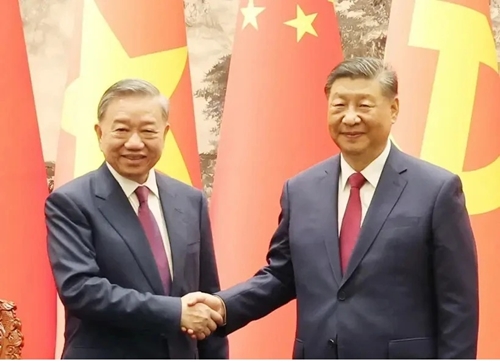General Secretary of the Communist Party of Vietnam (CPV) Central Committee and State President To Lam, his spouse, and a high-ranking delegation of Vietnam paid a state visit to China from August 18-20, at the invitation of General Secretary of the Communist Party of China (CPC) Central Committee and President of China Xi Jinping and his spouse.
    |
 |
|
Party General Secretary and President To Lam (left) and his Chinese counterpart Xi Jinping |
Talking to the press on the outcomes of the trip on August 20, the senior diplomat said the visit is considered a diplomatic event of special significance between Vietnam and China this year.
According to the minister, the top Vietnamese leader engaged in a diverse and meaningful working program during the visit with 18 activities over the course of more than two days. In the framework of the visit, the two sides issued a joint statement on further strengthening the comprehensive strategic cooperative partnership and deepening the building of the Vietnam-China community with a shared future. Numerous cooperation agreements were signed between ministries, sectors, and localities of both countries, covering areas such as inspection and quarantine, customs, healthcare, media, locality-to-locality cooperation, and social welfare.
FM Son stressed that in the discussions, the two sides reached overall consensus on further strengthening the comprehensive strategic cooperative partnership in accordance with the “six major orientations,” with a focus on translating their common perceptions and agreements into reality.
He said following the spirit of the joint statement and the high-level common perceptions reached during this visit, Vietnam and China will focus on promoting cooperation in the following key areas:
Firstly, top leaders of the two parties will continue to hold strategic exchanges, thus strengthening political trust and setting orientation for the building of the Vietnam-China community with a shared future that carries strategic significance.
They will fully utilize the role of the Party channel, cooperative mechanisms between committees of the National Assembly of Vietnam and the National People’s Congress of the People’s Republic of China, as well as the Vietnam Fatherland Front and the Chinese People's Political Consultative Conference, and exchange mechanisms in defense, security and diplomacy. Both sides agreed to leverage the overall coordination role of the Vietnam-China Bilateral Cooperation Steering Committee and to reinforce cooperation in defense and security.
Secondly, based on the “Six major orientations,” the two sides will continue to concretize high-level perceptions and signed agreements and strive for new progress in result-oriented cooperation. They will continue to facilitate trade, expand the export of Vietnamese agricultural and seafood products to the Chinese market, and promote connectivity of development strategies between the two countries. Both country will work to well implement the cooperation plan connecting the “Two Corridors, One Belt” framework with the “Belt and Road Initiative,” accelerate “hard connectivity” through high-speed railways, highways, and border gate infrastructure, and upgrade “soft connectivity” in smart customs and smart border management.
Furthermore, both sides will encourage and support enterprises with strong capabilities, reputation, and advanced technology to invest in each other’s markets, particularly in agriculture and infrastructure, and expand cooperation in new areas such as digital economy, circular economy, green development, clean energy, and renewable energy
Thirdly, the two sides agreed to designate 2025 as the "Vietnam-China Humanity Exchange Year." Accordingly, the two sides will jointly organize a series of activities to celebrate the 75th anniversary of the establishment of Vietnam-China diplomatic relations; enhance cultural exchanges, cooperation in communications, news, publishing and broadcasting; strengthen cooperation in the fields of medicine, healthcare, traditional medicine, natural disasters prevention, control and mitigation; expand and improve the effectiveness of locality-to-locality cooperation and people-to-people exchanges, especially among young generations; promote tourism cooperation, open more flight routes, and encourage more and more tourists to travel to the other country.
Fourthly, the two sides will strengthen multilateral coordination and cooperation; enhance coordination in mechanisms such as the United Nations, the Asia-Pacific Economic Cooperation Forum (APEC), and support each other's candidacy for international organizations. China supports Vietnam to host APEC 2027 and Vietnam's accession to and promote its role in multilateral mechanisms; China supports ASEAN in building a united, unified, self-reliant and developing ASEAN Community and in maintaining its central role in the regional structure.
Fifthly, the two sides agreed to continue to effectively implement high-level common perceptions, better control and actively resolve disagreements at sea; reaffirm the importance of maintaining and promoting peace, stability, freedom of navigation and aviation in the East Sea (aka South China Sea), agree to handle disputes by peaceful means on the basis of international law and the United Nations Convention on the Law of the Sea (UNCLOS) 1982.
The two sides will continue to coordinate in effectively implementing legal documents on land borders and related agreements, strengthen cooperation in the Vietnam-China land border area, and hold celebrations of the 25th anniversary of the Vietnam-China Land Border Treaty and the 15 years since the signing of three legal documents on the land border between the two countries.
Source: VNA